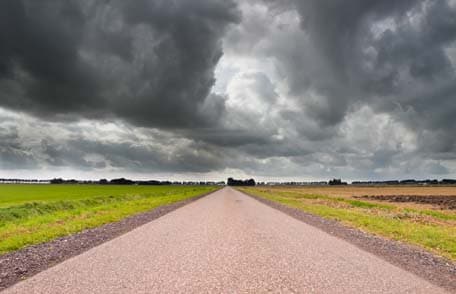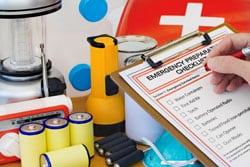Emergency Preparedness for Older Adults
Follow these easy steps to make sure you’re protected.

Natural disasters, such as hurricanes, tornadoes, and blizzards, may force you to evacuate your home or shelter-in-place at short notice. It is important to know what to do in case of an emergency well before disaster strikes.
If you are an older adult living in the community, you may face some challenges during an emergency. For example, you may have mobility problems, or chronic health conditions, or you may not have any family or friends nearby to support you. Support services that are usually available, such as help from caregivers or in-home health care and meal delivery services, may be unavailable for a period of time. In addition, older adults may experience challenges that come with advanced age, such as hearing or vision problems or cognitive impairment, which may make it difficult to access, understand, and respond to emergency instructions.
You or the person you care for can be prepared for emergency situations by creating a plan, reviewing or practicing it regularly, and keeping an emergency supply kit.
Creating a Plan

The first step in preparing for an emergency is creating a plan. Work with your friends, family, and neighbors to develop a plan that will fit your needs.
- Choose a contact person who will check on you during a disaster, and decide how you will communicate with each other (for instance, by telephone, knocking on doors). Consider speaking with your neighbors about developing a check-in system together.
- Create a list of contact information for family members and friends. Leave a copy by your phone(s) and include one in your Emergency Supply Kit.
- Plan how you will leave and where you will go during an evacuation. If you are living in a retirement or assisted living community, learn what procedures are in place in case of emergencies. Keep a copy of exit routes and meeting places in an easy-to-reach place.•Create a care plan and keep a copy in your Emergency Supply Kit. Try out CDC’s easy-to-use care plan templateCdc-pdf.
- If you have medical, transportation, or other access needs during an emergency, consider signing up for SMART911, Code Red, or your local county registry, depending upon which service your area uses to helps first responders identify people who may need assistance right away.
Creating an Emergency Supply Kit
After an emergency, you may not have access to clean water or electricity. Make sure you are prepared with your own supply of food, water, and other items to last for at least 72 hours.
- Visit Ready.gov for a list of basic items to gather for your Disaster Supply Kit.
- Medical-Related Items:
- A 3-day supply of medicine, at a minimum. If medications need to be kept cold, have a cooler and ice packs available.
- ID band (full name, contact number for family member/caregiver, and allergies)
- Hearing aids and extra batteries
- Glasses and/or contacts and contact solution
- Medical supplies like syringes or extra batteries
- Information about medical devices such as wheelchairs, walkers, and oxygen including model numbers and vender.
- Documents (Keep physical copies in a waterproof bag and take photos of each document for backup):
- Your Care Plan [PDF – 1 MB]
- Contact information for family members, doctors, pharmacies and/or caregivers
- List of all medications, including the exact name of the medicine and the dosage, and contact information for pharmacy and doctor who prescribed medicine
- List of allergies to food or medicines
- Copies of medical insurance cards
- Copies of a photo ID
- Durable power of attorney and/or medical power of attorney documents, as appropriate.
- Reaching At-Risk Populations in an Emergency (CDC)
- American Red Cross: Senior Emergency PreparednessExternal
- Disaster Preparedness Tip Sheets for Seniors (Specific Topics: Flood, Hot Weather, Winter, Pets, Earthquake, Power Outages, and Wildfire)External
- Ready.gov Individuals with DisabilitiesExternal
- Ready.gov Older AdultsExternal
- Administration for Community Living: Emergency PreparednessExternal
- Emergency Readiness for Older Adults and People with Disabilities (ACL)External
- Emergency Preparedness Month: “Disasters Don’t Plan Ahead. You Can.” (ACL)External
- Disaster Preparedness Guide for Seniors & CaregiversExternal